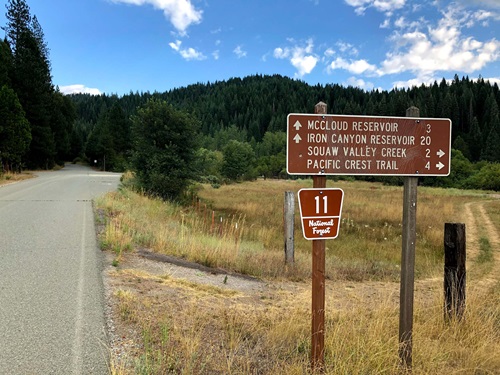Published Date:
Media Contact:
Assistant Secretary for Communications
(916) 502-4946

Signage off of Sq_ Valley Road in the County of Siskiyou. This road will be renamed through the AB 2022 renaming process. The creek name included on the sign has been renamed to Yét Atwam Creek through the U. S. Department of Interior’s renaming process that concluded in September 2022. Photo Credit: California Native Plant Society.
This week, the California Advisory Committee on Geographic Names (CACGN) formally released a list of “sq_” named places and features throughout the state that have been identified as locations for respectful renaming. The term “sq_” has been used historically as an offensive ethnic, racial, and sexist slur, specifically towards indigenous women. The identification of these sites is a major milestone in the renaming process, which is on track to be complete by January 1, 2025 under recently signed legislation.
Through the leadership of Department of Interior Secretary Deb Haaland, nearly 650 geographic features across the United States have already completed the federal renaming process. Approximately 80 of these geographic features were renamed in California and follow the proactive footsteps of Palisades Tahoe’s commitment to stop using the derogatory term in their business’s name. To continue this work, Assemblymember James Ramos introduced Assembly Bill 2022 (Chapter 479, Statutes of 2022), requiring the renaming of “sq_” names on public features and places not under federal jurisdiction, with the intent to use names that are respectful of tribes and tribal communities. This legislation passed by both houses with no opposition and was signed by Governor Gavin Newsom on September 23, 2022.
“Addressing offensive and derogatory names is one of many actions state and local governments can take to work collaboratively with California Native American tribes and local communities to acknowledge historical wrongs and move forward in the spirit of truth and healing,” said California Tribal Affairs Secretary Christina Snider-Ashtari. “The progress we are witnessing today is a testament to the long and hard-fought advocacy of Native peoples to re-envision a California that respects Native women. We appreciate the Biden Administration and Secretary Deb Haaland for their leadership in renaming the geographic features under federal jurisdiction and commend the California Legislature for creating a process for local communities to continue this important work across California.”
In 2023, California public agencies were required to identify and report to CACGN all instances of the derogatory “sq__” term in public geographic features and place names under their jurisdiction. A total of 61 locations were identified locally; after careful analysis and vetting, the CACGN determined that 43 of those locations met the criteria to be on the list (criteria included the site being in active use and not previously renamed through the federal renaming process). After the final list was announced, CACGN sent reminder notices to the public agencies to begin their consultations with California Native American tribes and engagement with the local community in the identification of appropriate and respectful replacement names.
“Tribes and tribal communities have been forced to bear the weight of this offensive term in the names of geographic features and places throughout the nation,” said California Natural Resources Agency Tribal Affairs Deputy Secretary Geneva E.B. Thompson. “Many of these locations are culturally significant places, near tribal communities, and are part of the daily lives of Native people. Having to interact with this term perpetuates violence against indigenous women and creates spaces where Native people feel unwelcomed and unsafe. We are excited to collaborate with public agencies, local communities, and California Native American tribes on finding respectful replacement names that reflect the values of the community and take a step closer to creating an inclusive California for all.”
CACGN and its executive sponsor, the California Natural Resources Agency, are committed to assisting public agencies navigate the renaming process. In the coming weeks and months, CACGN will lead efforts to implement these changes, including holding a public webinar on February 16, collaborating with state and local agencies throughout the renaming process, and continuing tribal consultations and public outreach to inform Californians about the importance of this effort. Public agencies are encouraged to work closely with California Native American tribes and local communities in the develop of renaming proposals, which are due to CACGN on August 5, 2024. The renaming proposal form can be found on CACGN’s website.
Several of the identified sites are under the authority of the state, such as CAL FIRE’s fire station in Fresno County and a fuel break in Siskiyou County.
“We look forward to continuing to work closely with California Native American tribes and the local communities in the renaming efforts,” said CAL FIRE Director Joe Tyler. “This is an opportunity to ensure CAL FIRE’s operations continue to advance inclusion of tribal and local communities.”
Between August and December 2024, CACGN will work with the public agencies to review and refine their proposals, if needed. A final meeting will be held in December to adopt renaming proposals, and CACGN will submit a report documenting this effort to the State Legislature in early 2025.
###


